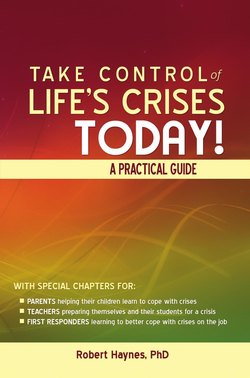Читать книгу Take Control of Life's Crises Today! A Practical Guide - Robert Haynes H. - Страница 5
На сайте Литреса книга снята с продажи.
PREFACE
ОглавлениеI pondered the topic of preparing for crises as I conducted therapy, trained psychology interns, taught various classes and workshops, and led debriefing sessions. Why do some people seem to know just what to do? And how did they mentally prepare for events so full of emotion and uncertainty? Several years ago I experienced a serious health crisis. As I reviewed my reactions, thoughts, and emotions, I felt I did very poorly in that stressful situation. I soon began to wonder how I could have handled it more effectively. This notion became a focal point for me, and a month after that experience I began to write this book. You will read about my personal experiences with a range of crises, and examine my successes as well as my failures. I have learned much over the years, and I continue to learn more every day that I can apply to handling crises. My goal in writing this book is to pass that knowledge and experience on to you. I believe we can all benefit from taking a proactive stance and improving our crisis readiness.
Today, more so than at any time in recent history, taking control of crises in your life is critical to living successfully. Financial difficulties, foreclosures, job loss, superstorms, raising kids, school shootings, kids on drugs, road rage, long lines at the supermarket, and fast-paced living are crises that we all may face. These crises may be large or small, a single event or an ongoing stressor. This book will help you develop a personalized plan and build on skills you already have to improve the way you respond in a crisis. Once you have defined your plan and practiced your new skills, you will be able to apply them in nearly any situation you encounter.
How to Get the Most From This Book
To get the maximum benefit from reading this book, you should read Chapters 1–6 and any of the specialty chapters that apply. You may streamline your experience by reading selected chapters. Here is a brief summary of what you can expect in each of the chapters. The first four chapters contain the essential introduction, understanding crisis, your self-assessment, and the program for learning to Take Control of Life’s Crises Today! If you only have time for the fundamentals, these four chapters provide a path you can follow on your own. Chapter 5, on resilience, and Chapter 6, on recovering from a crisis and practicing healthy self-care, are essential to developing a strong approach to crises now and in the future.
Three special chapters follow. If you are a parent or grandparent, or work with children in any fashion, Chapter 7, on preparing your child to cope with a crisis, is enlightening and empowering. Chapter 8 specifically focuses on the needs of teachers and other school workers and administrators. Chapter 9, for first responders, focuses on the stress first responders face and their special need for resilience as they are repeatedly sent out to help in times of crisis. Although their training may provide guidelines for action, first responders frequently lack resources for recovery and self-care.
You will get the most from this book if you are an active reader. Take time to think about your own experiences, and complete the exercises along the way. We learn by doing, not just by reading about doing. The more you participate in expanding your knowledge, the more likely it is that you will not only understand the concept of managing crises but actually be able to put these newfound skills into practice on a daily basis. Read, think, interact, challenge, practice, and implement. Begin to take control of your responses to life’s crises today.
Acknowledgments
Extensive research and reading went into the development of this book, but the insights I cherish most were gleaned from talking to people about their experiences and knowledge. I would like to thank the following individuals who provided input, case examples, or reviewed the manuscript at various stages: Patrick Callanan, James Daugherty, Michele Dignan, Jack Haynes, Andrew Heise, Charles T. Hendrix, John Keeley, Robert Macias, Crissa Markow, Michelle Muratori, Patricia Stalder, Roberta Stowe, Errin Taggart, Ian Taggart, Ryan Taggart, and Lisa Wolfe.
My thanks also go to Kay Mikel, manuscript editor, for her outstanding skill, wisdom, and guidance throughout the editorial process. I would like to give special thanks to Gerald Corey and Marianne Corey for their help with the manuscript, case examples, publishing resources, and their excellent guidance and modeling as brilliant writers and master therapists. Finally, thanks to my wife and best friend, Cheryl Haynes. Our frequent discussions of crisis topics and what we have learned from our own life experiences were invaluable in helping me shape this narrative.
Disclaimer
The material in this book is intended to help individuals, parents, teachers, first responders, and others in preparing themselves to better handle crises. This book is not intended as a substitute for training or counseling in the topics addressed. Anyone applying these ideas and methods in work settings should rely on agency policy and procedure as superseding the ideas presented in this book.
Information is constantly changing, with new research and theories being presented every day. The publisher and the author cannot be held responsible for the use of any of the ideas contained herein or for any error, omission, or dated material.
